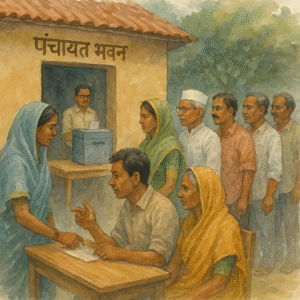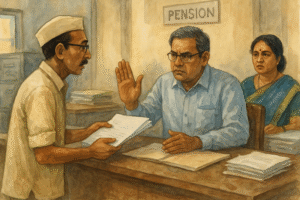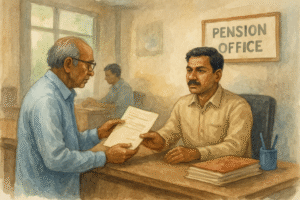The Patna High Court delivered a common oral judgment on February 23, 2022 dismissing two writ petitions seeking directions to allot shops/space in Bhagat Singh Market, Motihari. The petitions were heard together because they arose from identical facts and asked for similar reliefs. The Division Bench, speaking through Hon’ble Mr. Justice Chakradhari Sharan Singh and joined by Hon’ble Mr. Justice Madhuresh Prasad, held that the petitioners failed to establish that they were similarly situated to vendors in an earlier case where the District Magistrate, Motihari, had been asked to “explore the possibility” of allotting suitable space after an anti-encroachment drive.
The petitions invoked a prior order dated February 11, 2021 in CWJC No. 10351 of 2013 (Ranjan Kumar Sinha & Ors v. State of Bihar & Ors), where the Court had urged the District Magistrate to consider allotment of suitable space to avoid hardship to the affected families. However, the present Bench underscored that the earlier direction was contextual—aimed at small entrepreneurs who were being displaced specifically due to removal of encroachments—and did not apply in the absence of identical facts.
In these two writs, the petitioners asserted that they had shops in the same locality and were displaced by governmental action, hence entitled to alternative allotment in Bhagat Singh Market. The Court found otherwise. It recorded an admission that no encroachment-removal proceeding had ever been initiated against these petitioners. Consequently, they failed to prove that they were doing business in the very locality cleared during an anti-encroachment drive. On these findings, the Court concluded that the petitions lacked merit and dismissed them.
This ruling reinforces a key administrative law principle: parity of relief depends on parity of facts. A claimant seeking similar treatment must show that the factual matrix matches the precedent they rely upon. The Court’s approach also reflects judicial restraint when a prior order merely expresses “hope and trust” rather than issuing a binding command for allotment. The earlier order asked the District Magistrate to explore possibilities within six months; it did not create a vested right to an alternative shop for anyone unafflicted by the anti-encroachment exercise described in that case.
Significance or Implication of the Judgment
For the general public, especially small vendors and informal shopkeepers in Bihar, the judgment clarifies that courts will not grant allotment of public shop spaces merely on broad equitable pleas. Relief linked to rehabilitation after anti-encroachment measures requires clear proof that (i) an anti-encroachment proceeding targeted the claimant, and (ii) the claimant operated from the specific area cleared by the authorities. Absent these elements, a claim for alternative allotment cannot ride on a precedent tailored to differently placed vendors.
For government bodies—particularly municipal corporations and district administrations—this decision supports consistent, criteria-based rehabilitation measures. When previous court orders contain advisory language (e.g., “explore the possibility”), those orders do not automatically bind authorities to allot space to all later claimants. Instead, the administration must assess whether the claimant is genuinely a displaced person from an identified anti-encroachment action, and whether any policy applies. The judgment also discourages opportunistic claims unaccompanied by documents showing notice, seizure, removal, or other hallmarks of an encroachment proceeding.
Legal Issue(s) Decided and the Court’s Decision with Reasoning
- Whether the petitioners were similarly situated to the vendors in the earlier case (CWJC No. 10351 of 2013) so as to claim allotment in Bhagat Singh Market.
Decision: No. The Court held the petitioners failed to demonstrate factual parity with the earlier case. They could not show that an encroachment-removal proceeding had been initiated against them or that they operated from the cleared locality. - Whether the prior order dated 11.02.2021 obligated authorities to allot shops in these petitions.
Decision: No. The earlier order was context-specific and used advisory language (“hope and trust,” “explore the possibility”), which did not constitute a blanket, enforceable direction for allotment in unrelated factual settings. - Outcome of the writ petitions.
Decision: Both writ petitions were dismissed as devoid of merit.
Reasoning in brief:
The petitioners anchored their claim to a previous High Court order issued to safeguard vendors displaced by an anti-encroachment drive. But the present Bench found no foundational facts tying the petitioners to any such drive. The admitted absence of formal encroachment-removal proceedings against them and the failure to show their shops existed in the affected locality were fatal. Relief premised on “similarity” collapses without proof of similarity. Hence, no mandamus for allotment could be issued.
Judgments Referred by Parties (with citations)
- CWJC No. 10351 of 2013, order dated 11.02.2021 (Ranjan Kumar Sinha & Ors v. State of Bihar & Ors). Petitioners relied on the operative portion requesting the District Magistrate, Motihari, to explore allotment of suitable space within six months to prevent hardship to affected families.
Judgments Relied Upon or Cited by Court (with citations)
- The Court discussed the Ranjan Kumar Sinha order to distinguish it on facts; it did not extend its benefit to these petitioners because they could not show displacement by an anti-encroachment proceeding.
Case Title
Petitioner(s) v. State of Bihar & Ors (Common Oral Judgment)
Case Number
CWJC No. 9720 of 2021 with CWJC No. 9762 of 2021
Citation(s)
2021(2) PLJR 702
Coram and Names of Judges
Hon’ble Mr. Justice Chakradhari Sharan Singh and Hon’ble Mr. Justice Madhuresh Prasad. Date of Judgment: 23-02-2022.
Names of Advocates and who they appeared for
- For the petitioner(s) in both cases: Mr. Binod Kumar Mishra, Advocate.
- For the respondents (in CWJC 9720/2021): Mr. Ravish Chandra, AC to SC VI.
- For the respondents (in CWJC 9762/2021): Mr. Zaki Haider, AC to SC IX.
Link to Judgment
MTUjOTcyMCMyMDIxIzEjTg==-kj7xZcfFfGs=
If you found this explanation helpful and wish to stay informed about how legal developments may affect your rights in Bihar, you may consider following Samvida Law Associates for more updates.








